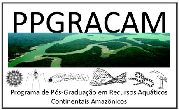Banca de DEFESA: STING SILVA DUARTE
Uma banca de DEFESA de MESTRADO foi cadastrada pelo programa.DISCENTE : STING SILVA DUARTE
DATA : 28/02/2019
HORA: 09:00
LOCAL: PPG-Racam, sala 03 do campus Amazônia
TÍTULO:
Population structure, condition factor and ectoparasites of Macrobrachium amazonicum HELLER, 1862 (Decapoda:Palaemonida) in areas of the mouth and low Amazon River
PALAVRAS-CHAVES:
Amazonian shrimp, population fluctuation, interspecific relations
PÁGINAS: 110
GRANDE ÁREA: Ciências Biológicas
ÁREA: Ecologia
RESUMO:
The present study investigated some aspects of bioecology of Macrobrachium amazonicum in populations from the mouth of the Amazon River, Amazon, Brazil. The study was conducted between May 2017 and April 2018 using data from the composition of the natural diet of this shrimp, its susceptibility to different traits in the capture, as well as the population structure, reproductive biology and the occurrence and relation of the ectoparasites of this species. The data collected in Mazagão-AP (00º15'39.9 ''S and 051º20 '42.3'W) and Island of Marrecas-PA (02º12' 19.3 ''S and 054º46 '17.9'W), demonstrated that M. amazonicum is an omnivorous species, with good attractiveness by the babassu meal about other baits. The populations of M. amazonicum evaluated have a favorable sex ratio for females, and the average length of shrimp on the Island of Marrecas is higher than in Mazagão. It was also possible to verify that this shrimps had a well-marked reproduction peak and it is related to the rainy season. However, the occurrence of ovigerous females and young shrimps the whole year indicates a continuous reproduction. Besides, it was possible to verify that the fecundity of this species is higher in the populations of the mouth than in the low Amazons. The data collected on parasitism in M. amazonicum show that the parasite Probopyrus pandalicola has a similar prevalence among the study areas and that the presence of this parasite affects the nutritional state of the shrimp. Also, was observed that this species of parasite is more abundant and prevalent in females than in males of M. amazonicum.
MEMBROS DA BANCA:
Interno - 1961826 - FRANK RAYNNER VASCONCELOS RIBEIRO
Interno - 1466772 - KEID NOLAN SILVA SOUSA
Externo ao Programa - 1636625 - MICHELLE MIDORI SENA FUGIMURA




